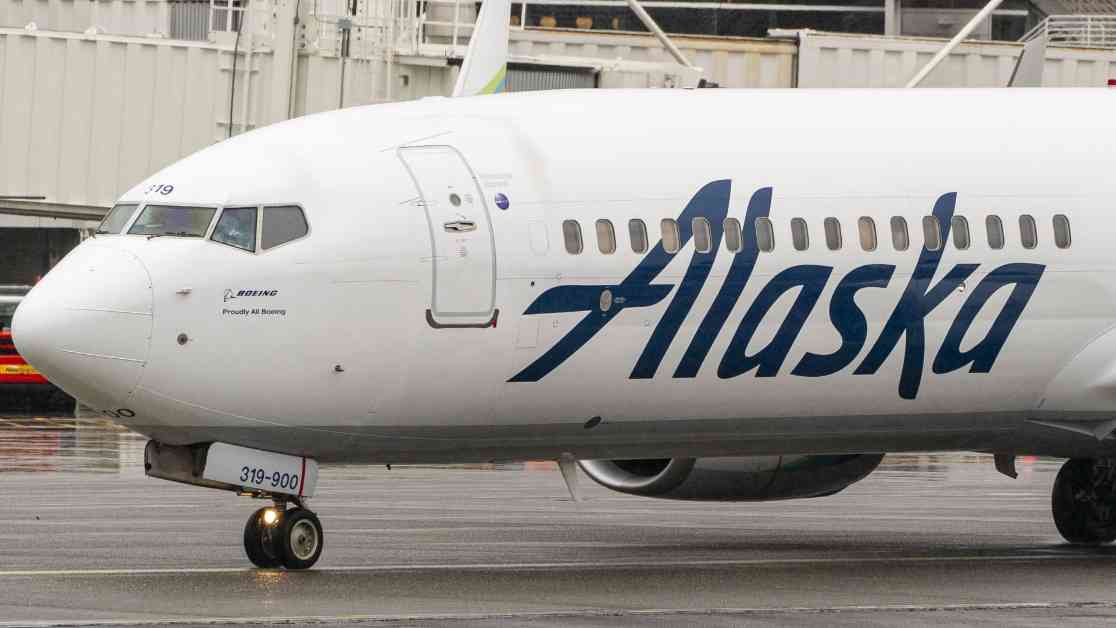Alaska Airlines Flight Attendants Reject New Contract, Union Calls for Further Negotiations
Alaska Airlines flight attendants have made a bold move by rejecting a new labor deal that would have brought immediate raises averaging over 24%. The decision was announced by their union, the Association of Flight Attendants-CWA, on Wednesday. This rejection sets the stage for further negotiations between the flight attendants and the airline as a potential merger with Hawaiian Airlines looms on the horizon.
The rejected agreement, which was tentatively reached in June, was described as a “record” deal by the union. It included provisions for boarding pay, back pay, and average pay increases of around 32% over the course of a three-year contract. Despite these enticing offers, the flight attendants decided that there was still more work to be done in order to address key issues that were not adequately covered in the proposed terms.
In a statement following the rejection, the union stated that they would be conducting a survey among their members to identify the specific concerns that need to be addressed in the negotiations moving forward. The union emphasized that their priority is to ensure that the final agreement reflects the crucial role that flight attendants play in the success of Alaska Airlines and is beneficial for the long-term prosperity of the company.
The airline, on the other hand, expressed their commitment to reaching an agreement that is mutually satisfactory for both parties. In their statement, Alaska Airlines acknowledged the importance of the flight attendants’ contributions and reiterated their dedication to finding a solution that recognizes and rewards their hard work.
The rejection of the proposed contract comes at a time when airline workers across the industry are advocating for better pay and improved working conditions in the aftermath of the Covid-19 pandemic. Labor negotiations were put on hold during the pandemic, but as the industry begins to recover, employees are pushing for fair compensation and treatment.
### Industry-Wide Push for Fair Compensation
The rejection by Alaska Airlines flight attendants is just one example of a broader trend within the airline industry where employees are demanding fair compensation for their work. Salaries and benefits are significant costs for airlines, and employees are seeking to ensure that they are adequately compensated for their contributions to the success of their respective companies.
The push for fair compensation is not limited to flight attendants; pilots, ground crew, and other airline workers have also been engaged in negotiations with their employers to secure better pay and working conditions. American Airlines recently reached a deal with its flight attendants union, and United Airlines is still in the process of negotiating a new contract with its flight attendants.
The Covid-19 pandemic exposed the vulnerabilities of the airline industry and highlighted the critical role that airline workers play in keeping operations running smoothly. As the industry begins to recover, employees are advocating for their fair share of the profits and benefits that come with the resurgence of air travel.
### Challenges and Opportunities in the Negotiation Process
Negotiating a new labor agreement is a complex process that involves balancing the interests of both the airline and its employees. While the rejection of the proposed contract by Alaska Airlines flight attendants may seem like a setback, it also presents an opportunity for both parties to address the underlying issues and reach a more equitable agreement.
One of the key challenges in the negotiation process is finding a balance between the financial stability of the airline and the fair compensation of its employees. Airlines have been hit hard by the pandemic, and many are still grappling with the financial repercussions of the past year. At the same time, employees are seeking to secure their livelihoods and ensure that they are fairly rewarded for their work.
Communication and transparency are essential components of successful negotiations. Both parties must be willing to listen to each other’s concerns, communicate openly and honestly, and work together to find solutions that benefit everyone involved. The rejection of the proposed contract by Alaska Airlines flight attendants signals a need for more dialogue and collaboration between the union and the airline to address the issues that led to the rejection.
### The Importance of Fair Compensation for Flight Attendants
Flight attendants play a crucial role in ensuring the safety, comfort, and overall experience of passengers during flights. They are responsible for a wide range of duties, including assisting passengers with boarding and disembarking, providing in-flight services, and responding to emergencies as needed. Despite the demanding nature of their job, flight attendants are often not adequately compensated for their work.
The rejection of the proposed contract by Alaska Airlines flight attendants underscores the importance of fair compensation for these essential workers. Flight attendants are on the front lines of the airline industry, interacting directly with passengers and representing the airline’s brand. They deserve to be recognized and rewarded for their contributions to the success of the airline.
Fair compensation for flight attendants is not just a matter of financial reward; it is also a matter of respect and recognition for the hard work and dedication that they bring to their jobs every day. By advocating for fair compensation, flight attendants are not only seeking to improve their own livelihoods but also to ensure that the airline industry as a whole values and appreciates the crucial role that they play in its operations.
### Moving Forward: The Path to a Fair Agreement
As negotiations between Alaska Airlines and its flight attendants continue, both parties have an opportunity to come together and find common ground on the key issues that led to the rejection of the proposed contract. By engaging in open and honest dialogue, listening to each other’s concerns, and working collaboratively to find solutions, the union and the airline can reach a fair agreement that benefits everyone involved.
The rejection of the proposed contract by Alaska Airlines flight attendants is a reminder of the importance of fair compensation and respectful treatment for all airline workers. As the industry continues to recover from the impact of the pandemic, it is crucial that airlines and their employees work together to build a more sustainable and equitable future for the industry.
In conclusion, the rejection of the proposed contract by Alaska Airlines flight attendants is a significant development that highlights the ongoing push for fair compensation and improved working conditions within the airline industry. By engaging in further negotiations and addressing the key issues that led to the rejection, both the union and the airline have an opportunity to reach a fair agreement that recognizes the essential role of flight attendants and ensures their well-being and success in the industry.






















